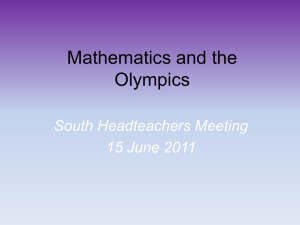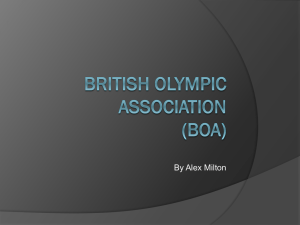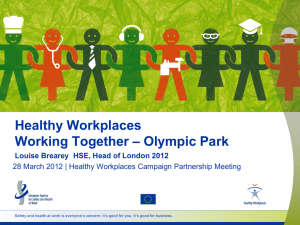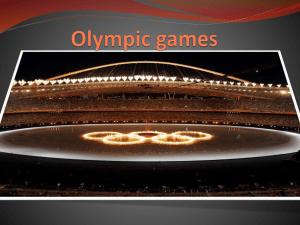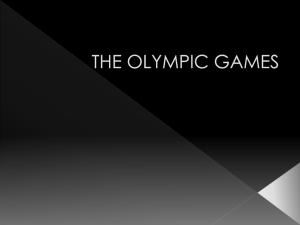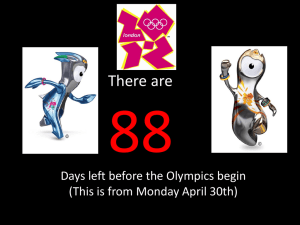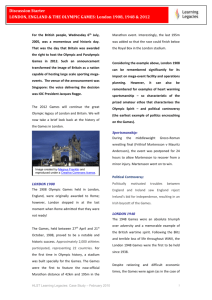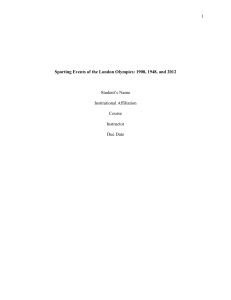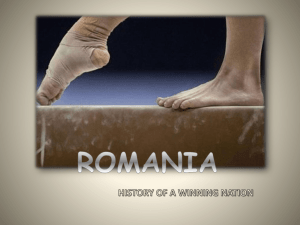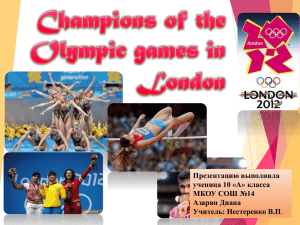The Olympics in 1908 and 1948
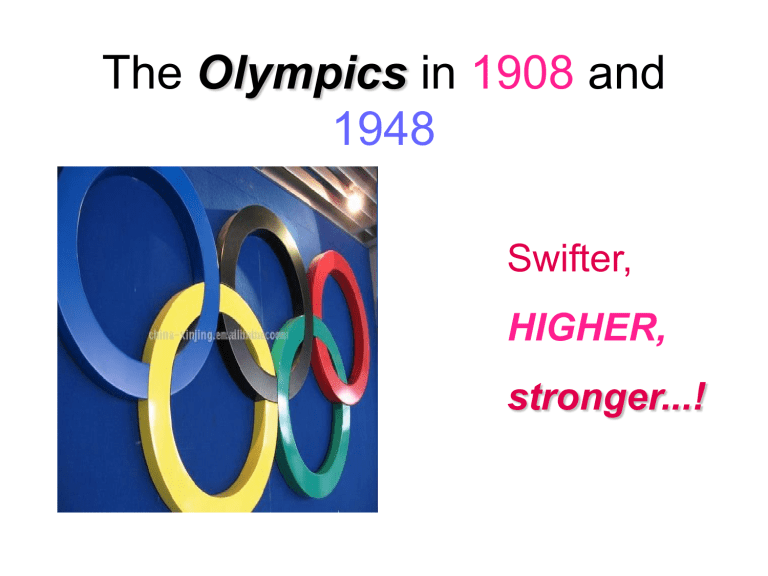
The
Olympics
in 1908 and
1948
Swifter,
HIGHER, stronger...!
The year 1908 –
London’s debut
The 1908 Summer Olympics (the Games of the IV
Olympiad) were the fourth modern Olympic Games and the third to be hosted outside of Athens , Greece .
The 1908 Olympic Games were originally scheduled to be hosted by Rome, but the 1906 eruption of Mount
Vesuvius caused the Games to be relocated to London.
These Games were much better organized than the previous regularly scheduled Olympic Games (they were even the first to have an opening ceremony).
Unfortunately the games were marred by politics and nationalism - Britain's recent refusal to give Ireland its independence caused Irish athletes to boycott the Games.
Trouble causing 400 metres
The biggest controversy arose because of a ruling of an incident during the 400-meter final heat.
There were four contestants during the race, one Briton, Wyndham Halswelle, and three Americans. American runner J.C. Carpenter , seemed to have won the race but the officials claimed he had interfered with the British runner and disqualified him.
A decision was made to rerun the race but the three Americans refused to take part and Halswelle was declared the winner after running the second race alone.
(W. Halswelle in both pictures)
Matters were even more disputed in the marathon
The final decision for the marathon event provided much drama as the exhausted leader Italian Dorando Pietri , came into the stadium and turned to wrong way and collapsed. He was tended to by doctors and assisted over the finish line by race officials, a clear violation of race rules. Pietri was declared winner but was later disqualified only after
British and American officials argued for an hour and fight broke out in the stands. The gold medal was awarded to second place runner,
American Johnny Hayes .
“
It is horrible, yet fascinating, this struggle between a set purpose and an utterly exhausted frame ”
Sir Arthur Conan Doyle on watching Pietri's marathon
After 40 years had passed from 1908...
...
it was London’s turn again (and so far the last one) to host the Olympic games. The Second World War was over, Europe was still ravaged from the war and many debated whether it was wise to have a festival when many European countries were in ruins.
To limit the United Kingdom's responsibility to feed all the athletes, it was agreed that the participants would bring their own food. Surplus food was donated to British hospitals.
Germany and Japan, the aggressors of World War II, were not invited to participate in 1948.
The Games of the XIV Olympiad turned out to be very popular and a great success. Approximately 4,000 athletes participated, representing
59 countries.
Olympic pictograms
Pictograms then... ...and now.
Olympic pictograms were introduced for the first time. There were twenty of them — one for each Olympic sport and three separate pictograms for the arts competition, the opening ceremony and the closing ceremony. They were called "Olympic symbols" and intended for the use on tickets. The background of each pictogram resembled escutcheon . Olympic pictograms would appear again 16 years later and be featured at each Summer Olympics thereafter.
Admirable achievements
There’s no doubt the Olympics, every time when held, display some of the most amazingly outstanding sportsmen, surprising victories, unlikely succeedings. Here are those of the year 1948.
17-year-old American Bob Mathias won the decathlon only four months after taking up the sport. He is the youngest athlete in Olympic history to win a men’s athletics event. Two athletes who were Olympic champions in 1936 managed to defend their titles twelve years later.
Fanny Blankers-Koen of the Netherlands entered four athletics events and won all four. Concert pianist Micheline Ostermeyer of France won both the shot put and the discus throw. Karoly Takacs was a member of the Hungarian world champion pistol shooting team in
1938 when a grenade shattered his right hand - his pistol hand. Takacs taught himself to shoot with his left hand and, ten years later, he won an Olympic gold medal in the rapid-fire pistol event.
The changing Games
Each time when hosting, the Britons have left their mark on the Olympic movement with their innovative approach:
1908
The Olympic Stadium (White City) was built especially for the Olympic Games.
Athletes paraded under their national flags at a ceremony at the start of the Games.
1948
Games shown on home television.
Starting blocks for Sprint races.
Volunteer Programme created to help run the Games.
A motto worth adopting
Pierre de Coubertin got the idea for this phrase from a speech given by
Bishop Ethelbert Talbot at a service for Olympic champions during the
1908 Olympic Games. The Olympic Creed reads: "The most important thing in the Olympic Games is not to win but to take part, just as the most important thing in life is not the triumph but the struggle. The essential thing is not to have conquered but to have fought well."
The ethos of those who took part in the 1948 Olympics was expressed in a letter to The Times by T P E Curry QC. "I did not do particularly well, but in those days it did not matter," he wrote, reiterating the motto of the Games' modern founder, Baron de Coubertin. "My contemporaries and I had much more fun and a greater sense of achievement than modern athletes do."
The journey through the fascinating, controversal and educating history of Olympics is not only reflecting the development of sporting and one’s physical ability, but simultaneously also the changing of national, political and other values, co-operation skills and the capability of taking part in peaceful, non-military rivalry. In 2012
London will hopefully host the Games like never before, drawing on the country’s proud Olympic heritage.
